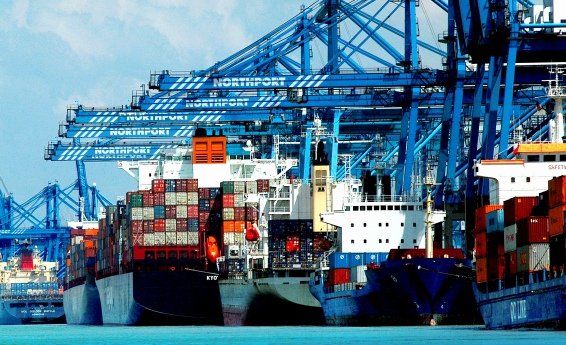Northport (Malaysia) Bhd has earmarked capital investment to purchase 34 new pieces of terminal equipment this year to boost the port’s capacity and competitiveness. — Reuters pic
KUALA LUMPUR, June 9 — Northport (Malaysia) Bhd has earmarked capital investment to purchase 34 new pieces of terminal equipment this year to boost the port’s capacity and competitiveness as it parallels the port operator’s anticipation of improved performance in the second half of the year, said chief executive officer Datuk Azman Shah Mohd Yusof.
Without revealing the capex allocation, Azman Shah stated that Northport’s performance for the second half of 2023 is expected to be better, considering its stellar performance last year and Malaysia’s trade performance, which has remained positive despite external headwinds and uncertainties.
-ADVERTISEMENT-
“It is a significant investment. We are spending money to improve capacity and facilities, but we must balance it against operational needs, such as a rubber gantry yard and container yards, which would improve our capacity and position us for future growth,”
“Despite the two years of (the Covid-19) pandemic, we maintained our performance and even broke the record in 2022, and although the first half of 2023 has been a little slow, we foresee the second half to be slightly better, and we intend to maintain the performance,” he told Bernama recently.
Northport, a member of MMC Group, has set a new record for its conventional cargo business segment in 2022 after surpassing 10 million Freight Weight Tonnes (FWTs) of cargo throughput, the highest achievement of cargo handling in a single year since the formation of Northport through the merger of Klang Container Terminal and Klang Port Management in 2000.
As at end-November 2022, the roll-on roll-off segment registered a significant double-digit growth of 76 per cent against the same period last year, spurred by the government’s tax incentives on the purchase of vehicles.
Meanwhile, biomass cargo handling at Northport’s 121-year-old port, Southpoint, also grew 61 per cent against the same period in 2021, while in May 2022, Northport recorded the highest monthly throughput of 1.1 million FWTs for its conventional cargo business segment, outstripping the previous record of 1.02 million FWTs previously.
Malaysia’s advantages in port operations
When asked about his optimism, Azman Shah stated that global trade dynamics are shifting due to supply chain disruption from just-in-time manufacturing to just-in-case manufacturing.
He said this shift has opened up opportunities for Northport because it operates 24 hours a day, seven days a week, unlike some global ports, which only operate during the day.
“Major hubs, such as India and China, were clogged up during the pandemic. US ports don’t operate at night, whereas Northport is 24 hours, so we are the only shop open, and everyone sends their cargo to us.
“So, we understand that we are able to be a regional distribution hub, and that is one of the advantages that we have when compared to neighbouring ports. Singapore, for instance, might be able to build vertical warehouses, but still, they are short of land (compared to Malaysia).
“As for us, let us talk about efficiency whereby we have ports which are very well linked, all the ports are multimodal, there are railway lines and highways connected (to the ports),” he said.
In terms of future expansions, he said Northport possesses tracts of land that are still developable, and this would bode well with the plan to establish it as a regional distribution hub, especially as Malaysia strengthens its relations with other countries, particularly China.
Northport currently manages two terminals in Port Klang, Northport (founded in 1965) and Southpoint (founded in 1901).
“The prime minister’s decision to visit China is positive because the Chinese will look at us in terms of regional hub distribution, so these are all plus factors that will be in for us to be a maritime hub,” he added.
In terms of port integration under MMC Corporation Bhd, Azman Shah said that MMC ports have standardised policies.
“We are in a better negotiating position because we worked as a group in terms of standardisation or performance with the digitalisation programme, which is actually group-wide.
“For example, the Port of Tanjung Pelepas is far ahead, and they have the knowledge. Therefore they are the benchmark, and everyone is striving to reach that level,” he added. — Bernama
Reference: https://www.malaymail.com/news/money/2023/06/09/northport-anticipates-better-2h-results-boosting-capacity-says-ceo/73402

